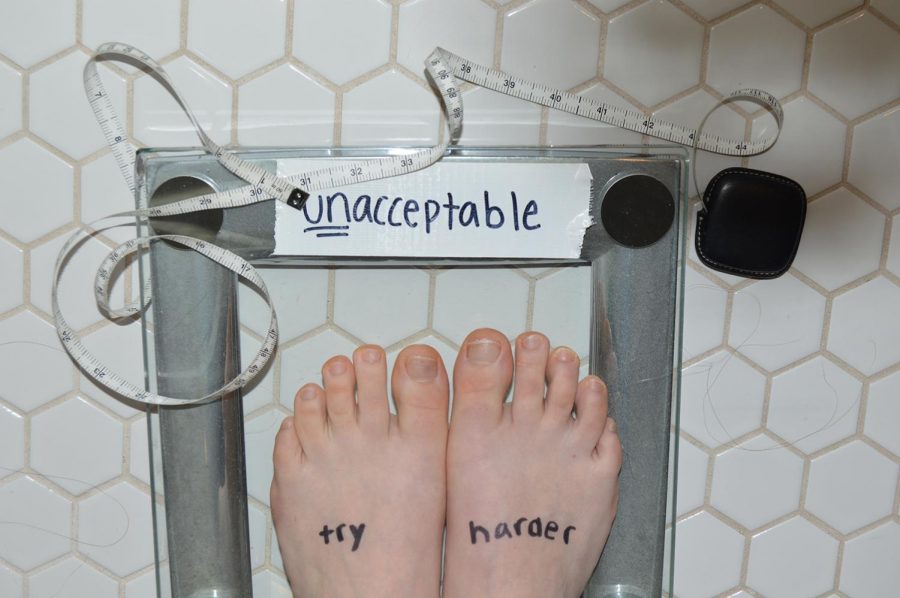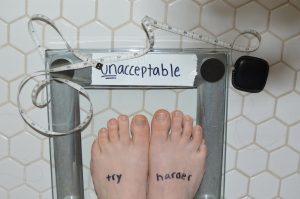‘Not adequate enough’: Los Angeles residents reflect on city’s beauty standards
Photo credit: Emily Eshel
In this photo staged by junior Emily Eshel, a girl stands on a scale that reads “unacceptable” where the weight is supposed to be located. Eshel created this image for an English project exploring beauty ideals. Sophomore Leah Abazari said that the pressure to be a certain weight and a certain body type can be “overwhelming.”
From flashy cars to green juices, West Los Angeles can seem like the perfect place to live. The Santa Monica beach always bustles with people because it is basically sunny year-round, and Rodeo drive is full of tourists and luxury shops. According to a U.S. News and World Report survey, Los Angeles is the 11th most desirable place to live in the U.S. — but the city’s beauty standards can peel back that facade, according to experts and students interviewed by the Oracle.
“It’s a tough place. You have to be a really confident person; otherwise, you’re going to get hurt,” LA-based psychiatrist Dr. Charles Sophy said. “It’s all looks-based, weight-based and clothes-based.”
Many girls are constantly anxious, sleep-deprived and under significant pressure, according to “The Triple Bind,” a book by Steven Hinshaw about societal pressures among adolescent girls. One in four girls today falls into a clinical diagnosis — depression, eating disorders and other mental/emotional disorders.
On top of the normal pressures teenagers face, girls in LA are surrounded by celebrities, which comes with coverage and mass media. Additionally, the modeling industry is more prevalent in LA, which has at least 22 modeling agencies. To put that in perspective, Austin, Texas, only has three.
Michelle Wolf, creator of EmpowHer LA, a blog dedicated to empowering women and girls across LA, said that growing up here was a difficult experience for her.
“We have so many different influences,” Wolf said. “Whether it be the media or entertainment, you’re going to be impacted by stereotypes regarding people’s style, looks or body image.”
Sophomore Leah Abazari feels living in LA perpetuates superficial stereotypes and promotes an unachievable lifestyle, body and social status. She said that these stereotypes don’t embrace each individual’s uniqueness, but set a bar so high that almost no one can reach it. Psychiatrist Sophy agrees.
“On one level, [the stereotypes are] not even real because if you go anywhere else in the country it isn’t like that,” Sophy said. “It is really difficult to meet that standard.”
LA media outlets like Hollywood Life and TMZ cover celebrities and models frequently, Sophy notes that this leads to girls seeing these picture-perfect people all the time, whether it is on social media or even in real life.
“We are exposed on the daily to so many beautiful perfect models,” Abazari said. “A lot of us young girls don’t know how to differentiate reality from what we see.”
Melina Alden, an LA-based therapist, echoed Abazari’s comments, saying that the culture in West LA promotes perfect bodies and an abundance of money. This makes it more difficult for people to connect on a real level.
“Everyone here is so used to having their AirPods in or being on their phone that we miss so many opportunities to connect organically with people,” Alden said. “We all just become more and more separate.”
According to Time, girls already are more hurt by social media than boys, and that is solely online. In LA, people will most likely see a model or somebody that fits into these “insane” beauty standards “at least once a day”, according to sophomore Presley Sacavitch.
“You become more judgmental of yourself,” Sacavitch said, “but also of other people.”
Sophomore Shaun Milton also feels this pressure. She acknowledges that although living in LA has been rewarding, she also feels that it has negatively impacted her mental health.
“It can be mentally exhausting, seeing all of these gorgeous people all the time,” Milton said. “I am constantly reminded of these unattainable beauty standards.”
Mental Health Club co-leader Jessica Tuchin (’21) said it is important to recognize that LA is full of people that go to extreme lengths to achieve ‘the perfect body.’
“The culture in LA is pretty toxic, especially around body image because there is ‘one right’ size, and I know a lot of people feel pressure to conform to society’s standard,” Tuchin said. “In mental health club, we definitely talk about body image and how LA creates a pressure to have a certain body type.”
The Oracle conducted a survey sent to the Archer upper school that revealed that only six out of the 39 girls that responded agreed with the statement “I am confident about my body.” Only 18% of the girls said that living in LA didn’t negatively affect their mental health.
A study by Beacon Economics shows there was a boom in LA’s film industry in 2018. Sacavitch described that surge, along with the rise of social media, as “suffocating.”
“We set up this thought that everything must look the same, like uniformity,” Wolf said, “but I think that it is important for a girl to first identify what is important to her.”
To find that path to connectivity, Angelenos might have to challenge society and try to surround themselves with positive people, good energy and maybe even nature, according to Alden. Wolf also expressed just how important it is to steer away from society’s pressures.
“For me, I kind of defy the gravity or severity of people feeling that they need to fit into a type as well as the societal norms and social pressures,” Wolf said. “I want each individual to look at themselves and figure out what’s going to work for them.”
Wolf touched on the importance of girls finding their own path, and how that can create a stronger sense of self-confidence. With that, girls can then diverge from the stereotypes that are so heavily enforced here.
“Each person is born with a value set of what they stand for,” Wolf said. “The more girls that are able to root themselves in that, the more they will be able to make decisions from a place of, ‘What do I want to create in this lifetime?’”

Chloe Fidler joined the Oracle as a staff reporter in 2019, became the Voices Editor in 2020 and continued that role through her senior year. Passionate...












Grace Doyle • May 21, 2020 at 6:10 pm
Chloe, this is incredible! Your passion for this subject shows through this amazing piece. I think every girl should read this. Thank you so much for covering a topic that effects so many girls!
Andrea Ramirez • May 21, 2020 at 5:29 pm
Chloe, this article was AMAZING. I love that you chose to talk about such a complex and important topic. So pumped to see what you will write about next!